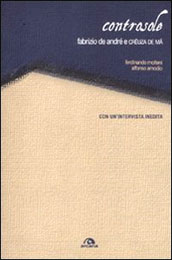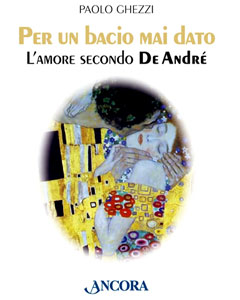|   Nestor Makhno Nestor Makhno
"Silence is not only the absence
of something
- A simple interval
between words and sounds -,
but is itself something "
(Romano Guardini, quoted by Andrea Fazioli in "disappearances").
Telling you about this music is a difficult job: I do not have enough eyes to take the measures, nor enough arms to embrace all. I'm in ingredients such as piano, cello, talent and luck, but I do not know exactly what percentage. I could start counting a list of details and tracks, and saying, first, that it was not written anywhere. And the music with his consistency, it seems to touch it, responds to vibrations at the tip of your fingers. It fills your ears and head but difficult to trace an outline, made as a bit of dreams and a little reasoning, invention took shape, odd shape, certainly not as unexpected imagined that up to just before, one day, a few hours, a time, even while going on. It looks like a cloud in the sky, a sky of clouds. It looks like a storm cloud the hasty thickening, and has the same concern of the gray sky when a lightning bolt free. That same gray metallic taste that try to hide the sun and unable to get nervous. Lightning.
Let us dwell on that very precise continuation of silence before the flash of lightning and follow it to the rumble of thunder, who takes an instant length and thickness, when it seems that even the birds stop flying, suspended. Here, the silence of this music is nurtured in that silence the music sinks roots and tentacles and claws and teeth and tears, the tears, it spreads around the dust and glare. Beware of the silence disappears. Beware of the volume. Beware of sudden noise that jumps on you, faceless black beast around the corner. I do not think that behind this music there is resentment, dissatisfaction, cheap resentment. I do not think there is some anger to move their hands on the instruments. To me this sound who struggles of anxiety, this noise without resignation seems to be a huge declaration of love. Love for love that it is hard to conquer.
Usually to try to explain something that is not easy to explain it to do with things you already know, lists, and comparisons are fixed distances and perspectives, and the kinship relations are assumed to draw a less fuzzy, a place in the middle the desert somewhere in the map. A place where you can lose a bit less, in short, where the horizon is a bit familiar.
Abandoning this game cruel and senseless, and without any intention to offend, I think the hands of Nicola Guazzaloca made of much more than the normal ten fingers. Finger cut and stitched together a mixture of hands-inch average indices and taken to Cecil Taylor and John Tilbury, and fingers spread of Veryan Weston and Gaetano Liguori. Fingers that have strangled jazz and classical music and wrote down the rattles on the staff. Fingers of visionaries, people who broke the rules and bypassed conventions. Fingers of others not because Nicola, self-taught, is satisfied with the imitation of famous brands, anything. I wrote it only because listening to the suggestions tangled and needed a compass emergency. Because heart sank one another and multiply and chase each other and overlap and arrive fast to the coast as waves of ocean, not as gentle waves of the lagoon: Nicola knows and caresses bring earthquakes in the same piece with the same ease with which are close to the white keys and blacks. Precipices and whispers in the same gesture, woods in the snow and sea stars in the same agreement, under the same fingers.
The other half of this music comes out of the cello by Francesco Guerri, a good one that does not make the Tristan Honsinger nor Erik Friedlander de 'Noantri, and who is not afraid to get on their way to somewhere else without a navigation system. One who knows how to deftly steer clear of Tom Cora long shadow, and yet so many small lights lit in memory. One who knows the color of its instrument of a voice that is severed head of Medusa and aurora borealis set, terrible and amazing, it makes you stay with your heart like a stone in midair and open the mouth and eyes with wonder. Francis has classical training and a list of experiences and interests kilometers long and wide from symphony orchestras to the evening with Carla Bozulich.
Nicola and Francesco lead time from teaching at the School of popular music of Ivan Illich Bologna. Active in the avant-jazz and experimental establishment local scene, both have worked with many musicians in Italy and abroad and have already released several titles documenting creative encounters and clashes, their music as they shake hands, like hugging, as shared secrets. Together, they inspired to the Ukrainian anarchist Nestor Makhno to attack the silence, creating a series of instant compositions are characterized by agitation, and dyed climates quite strong, sound objects not resigned or comforters that mocks all the signs of trespass and polite volume happily free sounds on which gravity and conventions of taste and harmonic laws shall have no importance whatsoever. I do not think will happen to all be able to offer, being able to look straight in the eye, a revolution that is joyful as this project together just terribly serious and smiling.
The recordings were made during a series of concerts at APositsia Art Forum in St. Petersburg, and Moscow and Nizhny Novgorod in the Long Arms Festival, and are available without having undergone any manipulation or retouching. The CD is offered in exchange for a free subscription.
I invite you to a ride on the web for in-depth interview with Nicola Guazzaloca hosted on www.sands-zine.com, online magazine devoted to musical forms and nothing less conventional.
Contact: Easy. Keep to the files found that both Nicola Francis, alone and together, on myspace and wherever you lead a search engine giving it a meal in their names and your curiosity.

 Controsole /
Per un bacio mai dato - Against the sun / For a kiss ever given Controsole /
Per un bacio mai dato - Against the sun / For a kiss ever given
 Two more books on Fabrizio De André? Sure, and who knows how many and which others will follow. These, it must be said at once, do not add great things to what already has been read around, it already knows and has already learned, but we welcome all contributions can be valuable-sometimes even a single phrase for understanding better, closer, deeper. Two more books on Fabrizio De André? Sure, and who knows how many and which others will follow. These, it must be said at once, do not add great things to what already has been read around, it already knows and has already learned, but we welcome all contributions can be valuable-sometimes even a single phrase for understanding better, closer, deeper.
The center "Controsole" (ed. Arcana, € 12.50) is made by a radio interview free of Savona in August 1984 during a concert tour of "Creuza de mä" held in the area. Faber interview with very little formal, and was closed in an audiotape found "by chance" (the official version, but it is nice to believe) after twenty-five years of darkness, which offers the opportunity to dwell on the roots fantastic that work so important and happy. In this book, "Creuza de mä" is told in a choir as a mosaic of insights and efforts, revealed slowly adding to the overall design-card after card-so many little details, nuances, impressions, confidence in a low voice as the sound of the sea. In addition to De André other entries in the book, almost all musicians, but not necessarily the stars of that album, by Riccardo Tesi and Zitello Vincenzo (who played in "Anime salve") to Pepi Morgia and Danila Satragno (which De André was traveling and concert companions). There is rightly Mauro Pagani, Max Manfredi is a very shy, a Beppe Gambetta solar sing the chorus in Genoa in the monuments of American rock, an inexplicable Patrizio Fariselli, and more.
The other is a book small in size but with great great great passion. It is proposed as a collection of those threads that hold together the words in the songs and between song and song, those who like to see wires colored red, and generally behind in shadow, as thin as to remain hidden, visible only to a few. The title is "Per un bacio mai dato - For a kiss ever given" (ed. Ancora, € 8.50), the author Paolo Ghezzi, the same of "The Gospel According to De André" released a few years ago. Ghezzi stops to pick up the words of love words-in particular-as if they were fragile flowers of the field, with all the delicacy of which he is capable. A book of short strokes, with special adjustments of light and salt. The writing is quietly, almost drawn in pencil point: I think there was a need for someone who had the courage to speak of De André without megaphones or claims, of someone who could make decisions without having to write sentences, acquittals and life sentences without dispensing without unnecessary inscriptions carved on marble. Ghezzi has the advantage of simplicity and a perfect aim. A reading which enriches, and from which it comes out with him a strong sense of peace.
 Marco
Pandin Marco
Pandin
stella_nera@tin.it
|

